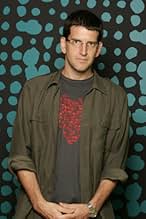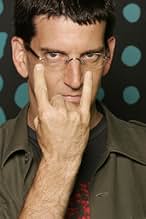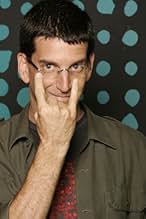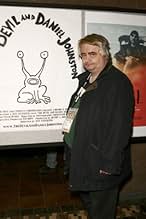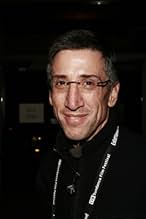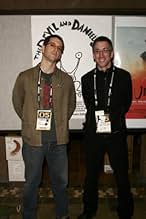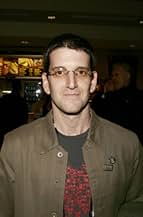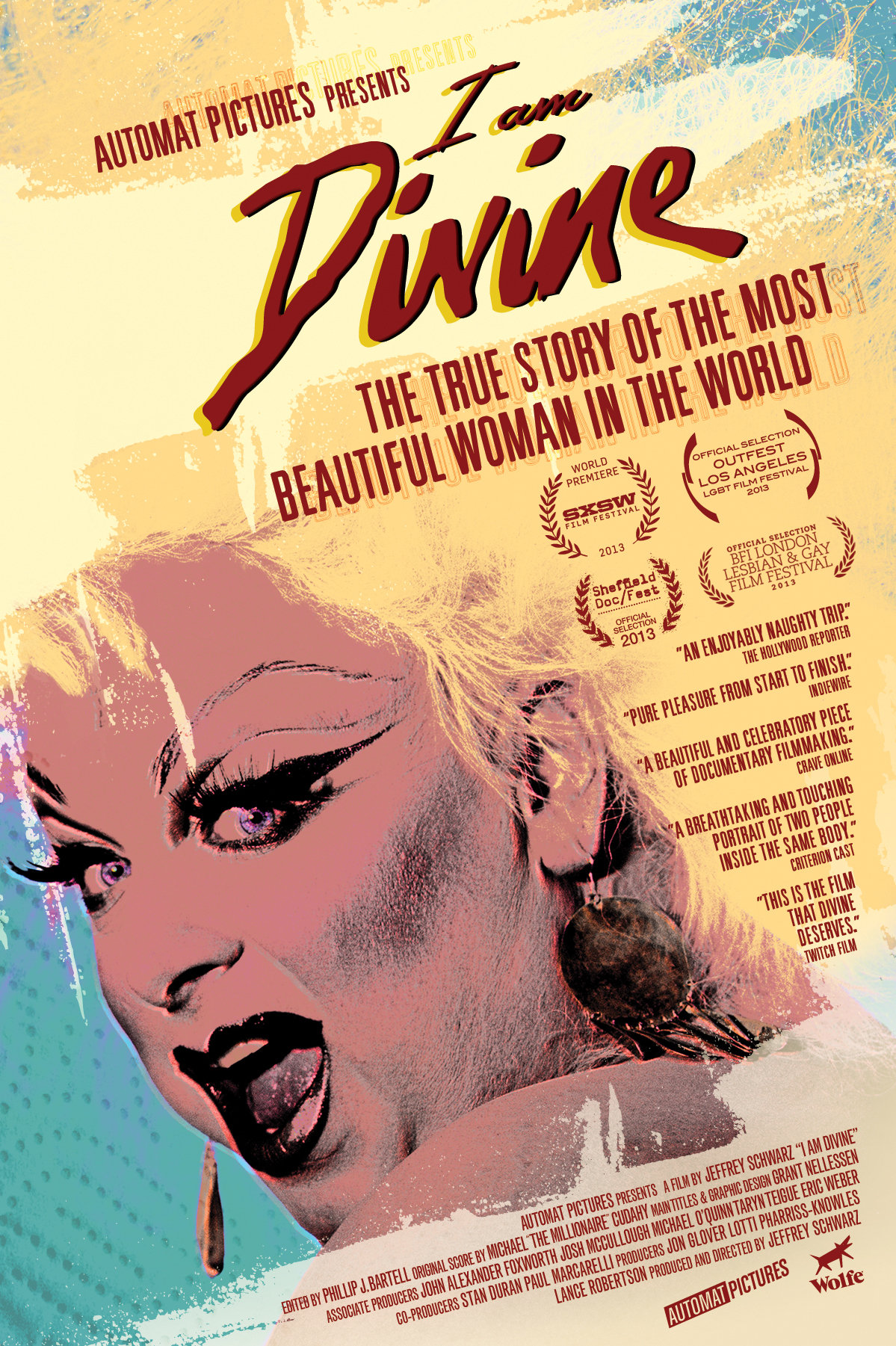IMDb-BEWERTUNG
7,9/10
10.798
IHRE BEWERTUNG
Füge eine Handlung in deiner Sprache hinzuDaniel Johnston, manic-depressive genius singer/songwriter/artist is revealed in this portrait of madness, creativity and love.Daniel Johnston, manic-depressive genius singer/songwriter/artist is revealed in this portrait of madness, creativity and love.Daniel Johnston, manic-depressive genius singer/songwriter/artist is revealed in this portrait of madness, creativity and love.
- Auszeichnungen
- 2 Gewinne & 3 Nominierungen insgesamt
Freddie Mercury
- Self
- (Archivfilmmaterial)
Empfohlene Bewertungen
Many of the great artists of history have suffered from some form of mental disorder, and we often find ourselves fascinated both by their brilliance and their madness. Of course, as this documentary points out, none of us ever had to actually live with a Van Gogh or a Lord Byron and deal with the real world consequences of what went on in their heads.
In The Devil and Daniel Johnston, Jeff Feuerzeig gives us a rare glimpse into the tortured mind of just such brilliant artist by effectively combining interviews from those who have known Daniel Johnston best with Johnston's own internal monologue. Feuerzeig achieves the latter because, apart from recording hundreds of songs on cassette tapes, Daniel recorded much of his life; from his mother screaming at him as a teenager to his arrest by park officials for painting Jesus fish on the Statue of Liberty to Johnston reading aloud about his own mental illness from the Diagnostic and Statistical Manual of Mental Disorders.
Many people came to know Daniel Johnston's work in the early 90s when Kurt Cobain famously called him the "greatest songwriter on Earth" and wore a t-shirt with an image from one of Johnston's hand-drawn album covers on the MTV Video Music Awards. Johnston's raw and introspective songs were subsequently covered by Nirvana, Sonic Youth, The Flaming Lips, Beck, and many others. Sadly, just as his music was making inroads into the popular consciousness Johnston's mental illness worsened (possibly accelerated by heavy LSD use), and his career and life entered increasingly troubled waters.
The Devil and Daniel Johnston works as a documentary about music, art, and mental illness all at the same time. It grants you unusual access to what's going on inside a the mind of a human being bursting with creative talent while simultaneously struggling to control the demons that haunt him. After watching this, don't be surprised if you find yourself wanting to hear more of Daniel Johnston's work.
In The Devil and Daniel Johnston, Jeff Feuerzeig gives us a rare glimpse into the tortured mind of just such brilliant artist by effectively combining interviews from those who have known Daniel Johnston best with Johnston's own internal monologue. Feuerzeig achieves the latter because, apart from recording hundreds of songs on cassette tapes, Daniel recorded much of his life; from his mother screaming at him as a teenager to his arrest by park officials for painting Jesus fish on the Statue of Liberty to Johnston reading aloud about his own mental illness from the Diagnostic and Statistical Manual of Mental Disorders.
Many people came to know Daniel Johnston's work in the early 90s when Kurt Cobain famously called him the "greatest songwriter on Earth" and wore a t-shirt with an image from one of Johnston's hand-drawn album covers on the MTV Video Music Awards. Johnston's raw and introspective songs were subsequently covered by Nirvana, Sonic Youth, The Flaming Lips, Beck, and many others. Sadly, just as his music was making inroads into the popular consciousness Johnston's mental illness worsened (possibly accelerated by heavy LSD use), and his career and life entered increasingly troubled waters.
The Devil and Daniel Johnston works as a documentary about music, art, and mental illness all at the same time. It grants you unusual access to what's going on inside a the mind of a human being bursting with creative talent while simultaneously struggling to control the demons that haunt him. After watching this, don't be surprised if you find yourself wanting to hear more of Daniel Johnston's work.
I saw this little gem at the Berlinale film festival in Berlin, with the director and the producer present. It is about the life and work of Daniel Johnston, a US singer/songwriter/painter with a manic depressive condition. In opposite to the director and many of the people participating in the movie, I do not regard Daniel Johnston as a genius, but he still is a very interesting character, and some of his songs and paintings are very moving. The film is very well done, quite uplifting and entertaining, with a big love for the main character and at the same time a nice and unoffensive sense of humor. I definitely recommend it, whether you are a fan of Daniel Johnstion or not. 9 out of 10.
For a crazy person, Daniel Johnston a manic-depressive from West Virginia in his forties now an obese chain-smoker on heavy meds and in the care of his parents, has had a wonderful life and a very creative one as an artist, songwriter and performer who's become a cult figure admired and performed by the likes of Tom Waits, Sonic Youth, and Kurt Cobain. Jeff Feuerzeig, whose title refers to Daniel's constant mental battles with Satan, has provided a rich and sympathetic external portrait; and Johnson's own endless cassette tapes, songs, and drawings (which, used as important sources, can't help bringing to mind such influential recent documentaries as Andrew Jareaki's Capturing the Friedmans and Jonathan Caouette's Tarnation), provide as good a picture of what's going on inside Johnston's head as we're going to get.
Johnston has been celebrated by a long string of artists and become a cult figure to his fans for his purity, innocence, honesty, and raw pain. Like Caouette, he was unappreciated by his parents and particularly his mother, who thought he spent too much time writing songs and drawing pictures when he was young, and called him a "lazy bum" for not doing his chores around the house. His compulsive creativity was never really appreciated by his fundamentalist Christian family, though since thousands of admirers have applauded him at concerts, surely they begin to appreciate it now.
The many films and tapes of him show Daniel was a charming if unstable young man, buoyant, full of fun, uncooperative, laughing in a teenage film he plays both himself and his abusive mom and beginning to compose the songs that others have said sum up the Beatles, Bob Dylan, and other pop greats, though his voice is tuneless and whiny and his piano playing jangly and when he switched to guitar, that was worse. His parents took him out of college because he wasn't doing well, and put him to work. He didn't like that, so they farmed him out to siblings. Luck brought him to Austin in the early Eighties where he worked in a Macdonald's for a surprising length of time considering that he wasn't good at any of the jobs there (he cleared tables) and he was discovered by music writers, an editor, and a man who became his manager and almost his slave (Jeff Tartakov, the manager he fired, who still devotes his life to distributing copies of his tapes).
Johnston had repeated bouts in mental institutions and became increasingly delusional. A period of heavy LSD use clearly led to one of his worst crises: and yet he can recount all this himself, and his mind seems astonishingly lucid. (This is one of the saddest things about madness: that the mad know they're mad, but can do nothing about it.) For all his crises, the Austin public embraced Johnston and he got top awards for folk singing and song writing an event that sat ill with some professional musicians at the time, but satisfied the lust for fame that motivated Johnston, who'd been on MTV, and knew how to grab the spotlight better than he knew how to play his guitar.
I can't see the virtue of Johnston's music and drawings, or rather I can, but I disagree with those in the film who insist he's not an outsider artist. He fits that category well; he's just come along at a time when plaintive whining, alienation, and musical primitivism are the rage, and he was taken up by some admirable champions. However, when he finally got a recording contract drawn up initially when he was in a mental institution his first album issued by Atlantic Records sold only a few thousand copies and he was dropped in two years, showing that despite stars' covers of his songs, he himself has no mainstream appeal, or ability to work in a professional format either as a musician or a visual artist. Nonetheless Johnston's open nature, his clarity, his sense of the redeeming artistic value of love, and his ceaseless artistic productivity are unmistakable and justify the attention that has been lavished upon him. This doesn't stop his story from being ultimately a sad one. For all his parents' caring in latter years, for all his championing by editors and managers, he cannot function on his own. Since his meds stifle his creativity, he has tended to give them up for two weeks before a public performance, and after one of the biggest ones, when his dad was flying the two of them home in his little plane, he overpowered him and took the controls and they crashed into some trees, barely surviving. Well, I guess all artists are a bit reckless, but it's just a matter of degree.
Making full use of films, tapes, and recent interviews, Jeff Feuerzeig has produced a wonderful film that is as good a document of a man as modern techniques allow. And the enduring popular notions of artistic life as train wreck and artistic genius as mental derangement remain unchallenged.
(Feted at fests in mid to late 2005, The Devil and Daniel Johnston went into limited US release March 31, 2006.)
Johnston has been celebrated by a long string of artists and become a cult figure to his fans for his purity, innocence, honesty, and raw pain. Like Caouette, he was unappreciated by his parents and particularly his mother, who thought he spent too much time writing songs and drawing pictures when he was young, and called him a "lazy bum" for not doing his chores around the house. His compulsive creativity was never really appreciated by his fundamentalist Christian family, though since thousands of admirers have applauded him at concerts, surely they begin to appreciate it now.
The many films and tapes of him show Daniel was a charming if unstable young man, buoyant, full of fun, uncooperative, laughing in a teenage film he plays both himself and his abusive mom and beginning to compose the songs that others have said sum up the Beatles, Bob Dylan, and other pop greats, though his voice is tuneless and whiny and his piano playing jangly and when he switched to guitar, that was worse. His parents took him out of college because he wasn't doing well, and put him to work. He didn't like that, so they farmed him out to siblings. Luck brought him to Austin in the early Eighties where he worked in a Macdonald's for a surprising length of time considering that he wasn't good at any of the jobs there (he cleared tables) and he was discovered by music writers, an editor, and a man who became his manager and almost his slave (Jeff Tartakov, the manager he fired, who still devotes his life to distributing copies of his tapes).
Johnston had repeated bouts in mental institutions and became increasingly delusional. A period of heavy LSD use clearly led to one of his worst crises: and yet he can recount all this himself, and his mind seems astonishingly lucid. (This is one of the saddest things about madness: that the mad know they're mad, but can do nothing about it.) For all his crises, the Austin public embraced Johnston and he got top awards for folk singing and song writing an event that sat ill with some professional musicians at the time, but satisfied the lust for fame that motivated Johnston, who'd been on MTV, and knew how to grab the spotlight better than he knew how to play his guitar.
I can't see the virtue of Johnston's music and drawings, or rather I can, but I disagree with those in the film who insist he's not an outsider artist. He fits that category well; he's just come along at a time when plaintive whining, alienation, and musical primitivism are the rage, and he was taken up by some admirable champions. However, when he finally got a recording contract drawn up initially when he was in a mental institution his first album issued by Atlantic Records sold only a few thousand copies and he was dropped in two years, showing that despite stars' covers of his songs, he himself has no mainstream appeal, or ability to work in a professional format either as a musician or a visual artist. Nonetheless Johnston's open nature, his clarity, his sense of the redeeming artistic value of love, and his ceaseless artistic productivity are unmistakable and justify the attention that has been lavished upon him. This doesn't stop his story from being ultimately a sad one. For all his parents' caring in latter years, for all his championing by editors and managers, he cannot function on his own. Since his meds stifle his creativity, he has tended to give them up for two weeks before a public performance, and after one of the biggest ones, when his dad was flying the two of them home in his little plane, he overpowered him and took the controls and they crashed into some trees, barely surviving. Well, I guess all artists are a bit reckless, but it's just a matter of degree.
Making full use of films, tapes, and recent interviews, Jeff Feuerzeig has produced a wonderful film that is as good a document of a man as modern techniques allow. And the enduring popular notions of artistic life as train wreck and artistic genius as mental derangement remain unchallenged.
(Feted at fests in mid to late 2005, The Devil and Daniel Johnston went into limited US release March 31, 2006.)
10lokidog
This film take you on a journey into a creative genius' struggle with life. Daniel Johnston recorded his entire life on cassette tape and his early life on film. Later he appeared on MTV, and in venues in Austin, TX on film and video. These provide the film-maker with a wide array of media for telling this story.
Jeff Feuerzeig weaves this material seamlessly into what is one of the most emotionally wrenching films I've seen in the last year and one of my favorite documentaries ever. It is hard to compare this film with documentaries like those of Michael Moore which are comedic and topical, or those of Errol Morris, which tend to focus on issues and facts. This documentary brings emotional threads and creativity into play in a way that dissolves the usual harsh contrast between a story and it's telling. You forget you are watching a documentary film, and become immersed in Daniel's life. Daniel's effect on those around him is interwoven with his own recordings. His family and friend are there to add to his story to show how his life is reflected upon them. Feuerzeig use of Daniel's parents narrative is simply masterful - it provides important information, and at the same time illustrates the the emotional turmoil his illness causes in the lives of those that love him. Daniel's family is portrayed from the early period of his illness when they have no idea what mental illness really means, to the present time when they become his supporters and advocates. Eventually, family and friend's are shown coming to terms with Daniel's mental illness, and experience their own emotional growth as well.
It deservedly won the Directors Award at Sundance 2005, and I think it would have won the audience award if it had a different play schedule.
Jeff Feuerzeig weaves this material seamlessly into what is one of the most emotionally wrenching films I've seen in the last year and one of my favorite documentaries ever. It is hard to compare this film with documentaries like those of Michael Moore which are comedic and topical, or those of Errol Morris, which tend to focus on issues and facts. This documentary brings emotional threads and creativity into play in a way that dissolves the usual harsh contrast between a story and it's telling. You forget you are watching a documentary film, and become immersed in Daniel's life. Daniel's effect on those around him is interwoven with his own recordings. His family and friend are there to add to his story to show how his life is reflected upon them. Feuerzeig use of Daniel's parents narrative is simply masterful - it provides important information, and at the same time illustrates the the emotional turmoil his illness causes in the lives of those that love him. Daniel's family is portrayed from the early period of his illness when they have no idea what mental illness really means, to the present time when they become his supporters and advocates. Eventually, family and friend's are shown coming to terms with Daniel's mental illness, and experience their own emotional growth as well.
It deservedly won the Directors Award at Sundance 2005, and I think it would have won the audience award if it had a different play schedule.
I saw this at the SXSW movie festival. This movie portrays the legendary song-writer (fans of his consist of: Sonic Youth, Curt Cobain, Beck, etc.), Daniel Johnston's roller-coaster life: through his early recordings in his basement to being on MTV to his battles with manic depression(which caused him to have delusions) to his art and comics and ending up in mental hospitals. Throughout the movie the film looks at Daniel's life through friends and family. Honestly, even if you aren't a fan you'd enjoy it. Even the way it was filmed and put together is so unique it was amazing to watch. A must see for any Daniel Johnston fan.
Wusstest du schon
- WissenswertesAs seen in the DVD extras, Daniel and Laurie would meet again after 30+ years following a screening of this film. She said she kept every memento he gave her and was grateful that he always built up her self esteem and said so many nice things to her when they were friends. The two shared a beautiful moment with a nice hug when they saw each other again.
- Zitate
Daniel Johnston: I never met a girl I didn't meet.
- VerbindungenFeatured in Segundo aniversario (2007)
- SoundtracksSilly Love
Written by Daniel Johnston
Performed by Daniel Johnston
Published by Eternal Yip Eye Music (BMI)
Administered by BUG Music Publishing
Top-Auswahl
Melde dich zum Bewerten an und greife auf die Watchlist für personalisierte Empfehlungen zu.
- How long is The Devil and Daniel Johnston?Powered by Alexa
Details
Box Office
- Bruttoertrag in den USA und Kanada
- 334.450 $
- Eröffnungswochenende in den USA und in Kanada
- 23.192 $
- 2. Apr. 2006
- Weltweiter Bruttoertrag
- 432.339 $
- Laufzeit1 Stunde 50 Minuten
- Farbe
- Sound-Mix
- Seitenverhältnis
- 1.85 : 1
Zu dieser Seite beitragen
Bearbeitung vorschlagen oder fehlenden Inhalt hinzufügen

Oberste Lücke
What is the French language plot outline for The Devil and Daniel Johnston (2005)?
Antwort

